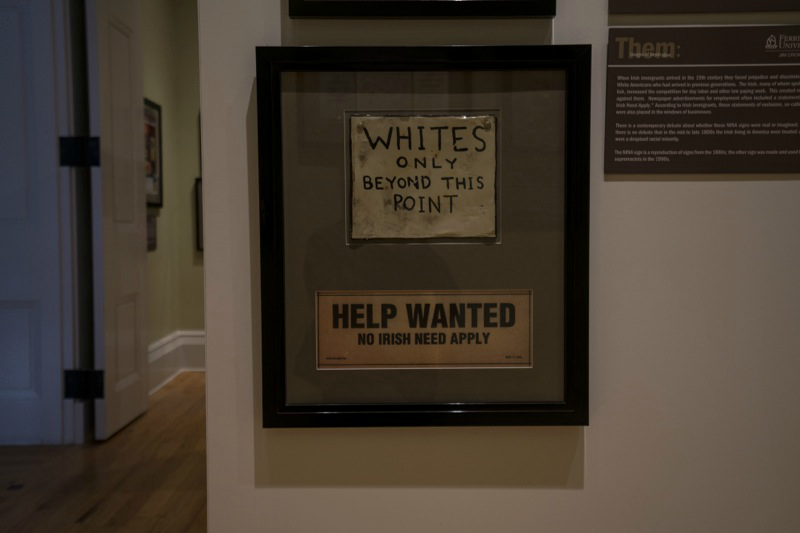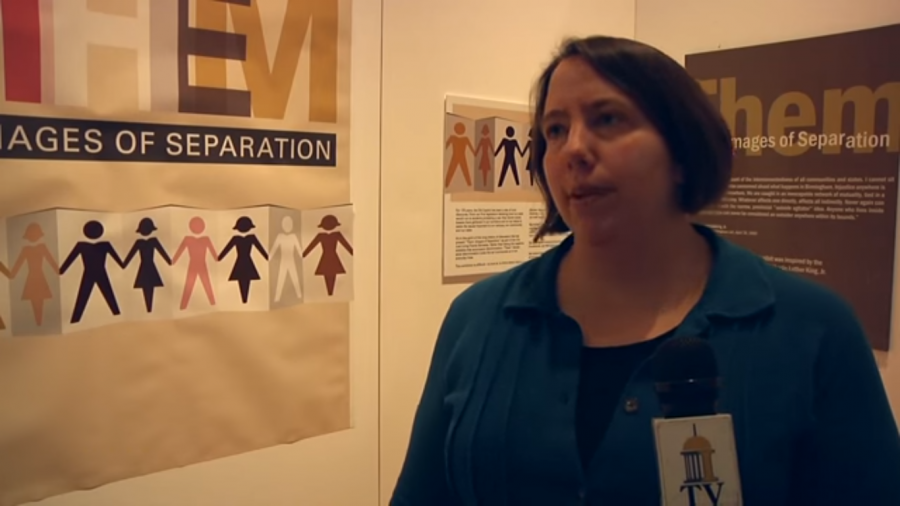Tessa Solomon
A frayed white poster, bruised yellow in spots, catches the eye. On its face, a dark, hand-painted message proclaims: “Whites only beyond this point.”
“The images in this exhibit are meant to set up a separation between us and them,” said Trina Roberts, the director of the Pentacrest Museums and Just Living Planning Advisory Board. “Cultures set up that separation, and then begin to ridicule, thinking it’s OK because of that separation. All of these images are illustrating that idea from different perspectives.”
Since its inception, Iowa’s theme semester has been determined to bring Iowa City’s community together around relevant issues.
“It’s all about teaching and learning; that’s the backbone of what the theme semester means,” said Chuck Swanson, executive director of Hancher and Just Living Planning Advisory Committee. “We definitely want to engage students, but it’s important to work together with the outside community, too.”
During the planning process in 2014, the advisory committee was flooded with petitions for a social-justice theme.
“It seemed like a theme that many people on campus could stand behind, feel positive about,” said Linda Snetselaar, associate provost for Outreach & Engagement. “With all the things that have been happening on campuses, having conversations about valuing and caring about others seems even more relevant now.”
Controversies such as the University of Missouri protests highlight the relevance of the exhibit’s themes. Images barely dating back 15 years are nestled between weathered board games and 1940s–era memorabilia. A large-scale photograph displays a lynched African-American man; the crime took place in 1981.
Click here to check out a photo slideshow.
“You’ll see original Aunt Jemima advertising but also Mexican comics that were issued in 2005, so clearly this is not a problem stuck in the past: it’s surrounding us now,” Roberts said.
With content ranging from ludicrous to horrific, it is no surprise Roberts chose to erect a barrier concealing the gallery.
“The idea is to not ambush anyone with difficult, gut-wrenching images when they walk into the exhibit,” Roberts said. “We don’t want someone walking to see these things without meaning to. We want people to step into that room, knowing about the possibly upsetting images and be mentally prepared for that.”
Arranged thematically, the pieces include topics of sexism, racism, and bigotry.
After the patrons’ trip through prejudice, the exhibit ends on optimism. The viewer leaves with the image of the 1992 Australian Council of Aboriginal Reconciliation poster: multicolored arms linked in forgiveness, reaching for the same goal.
“I hope this is positive for students, that this can bring in a new perspective that they may not have thought of previously,” said sophomore Nazira Coury, Just Living Student Ambassador. “We’re the future, we’re the ones that can change these attitudes.”



